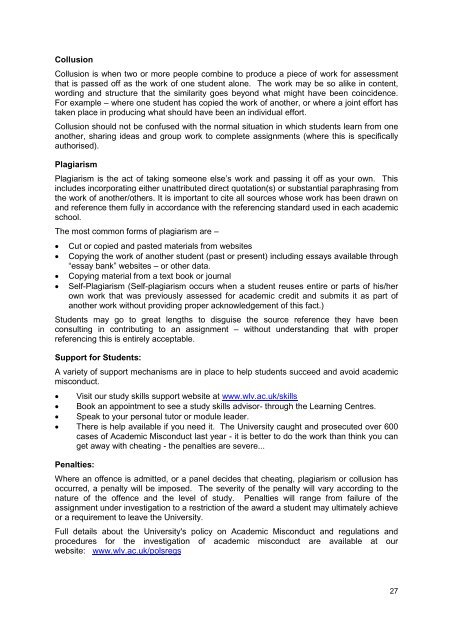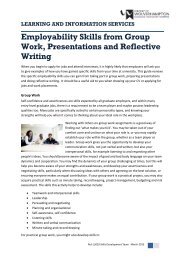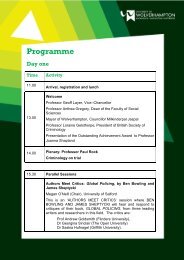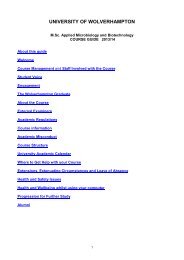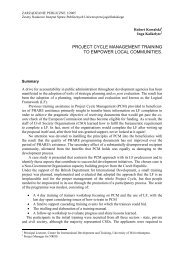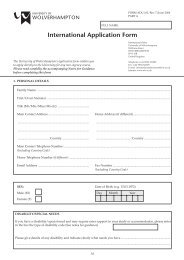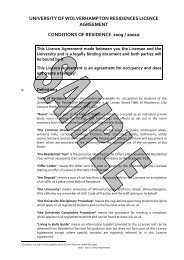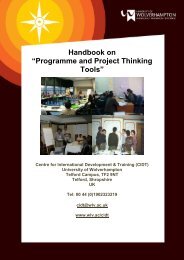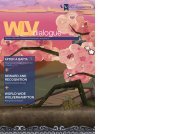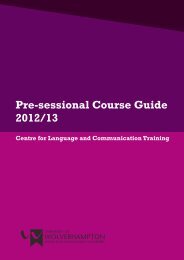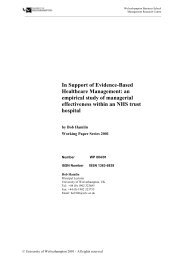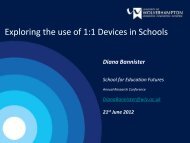(Hons) Marketing Management and Human Resource Management
(Hons) Marketing Management and Human Resource Management
(Hons) Marketing Management and Human Resource Management
Create successful ePaper yourself
Turn your PDF publications into a flip-book with our unique Google optimized e-Paper software.
Collusion<br />
Collusion is when two or more people combine to produce a piece of work for assessment<br />
that is passed off as the work of one student alone. The work may be so alike in content,<br />
wording <strong>and</strong> structure that the similarity goes beyond what might have been coincidence.<br />
For example – where one student has copied the work of another, or where a joint effort has<br />
taken place in producing what should have been an individual effort.<br />
Collusion should not be confused with the normal situation in which students learn from one<br />
another, sharing ideas <strong>and</strong> group work to complete assignments (where this is specifically<br />
authorised).<br />
Plagiarism<br />
Plagiarism is the act of taking someone else’s work <strong>and</strong> passing it off as your own. This<br />
includes incorporating either unattributed direct quotation(s) or substantial paraphrasing from<br />
the work of another/others. It is important to cite all sources whose work has been drawn on<br />
<strong>and</strong> reference them fully in accordance with the referencing st<strong>and</strong>ard used in each academic<br />
school.<br />
The most common forms of plagiarism are –<br />
<br />
<br />
<br />
<br />
Cut or copied <strong>and</strong> pasted materials from websites<br />
Copying the work of another student (past or present) including essays available through<br />
“essay bank” websites – or other data.<br />
Copying material from a text book or journal<br />
Self-Plagiarism (Self-plagiarism occurs when a student reuses entire or parts of his/her<br />
own work that was previously assessed for academic credit <strong>and</strong> submits it as part of<br />
another work without providing proper acknowledgement of this fact.)<br />
Students may go to great lengths to disguise the source reference they have been<br />
consulting in contributing to an assignment – without underst<strong>and</strong>ing that with proper<br />
referencing this is entirely acceptable.<br />
Support for Students:<br />
A variety of support mechanisms are in place to help students succeed <strong>and</strong> avoid academic<br />
misconduct.<br />
Visit our study skills support website at www.wlv.ac.uk/skills<br />
Book an appointment to see a study skills advisor- through the Learning Centres.<br />
Speak to your personal tutor or module leader.<br />
There is help available if you need it. The University caught <strong>and</strong> prosecuted over 600<br />
cases of Academic Misconduct last year - it is better to do the work than think you can<br />
get away with cheating - the penalties are severe...<br />
Penalties:<br />
Where an offence is admitted, or a panel decides that cheating, plagiarism or collusion has<br />
occurred, a penalty will be imposed. The severity of the penalty will vary according to the<br />
nature of the offence <strong>and</strong> the level of study. Penalties will range from failure of the<br />
assignment under investigation to a restriction of the award a student may ultimately achieve<br />
or a requirement to leave the University.<br />
Full details about the University's policy on Academic Misconduct <strong>and</strong> regulations <strong>and</strong><br />
procedures for the investigation of academic misconduct are available at our<br />
website: www.wlv.ac.uk/polsregs<br />
27


